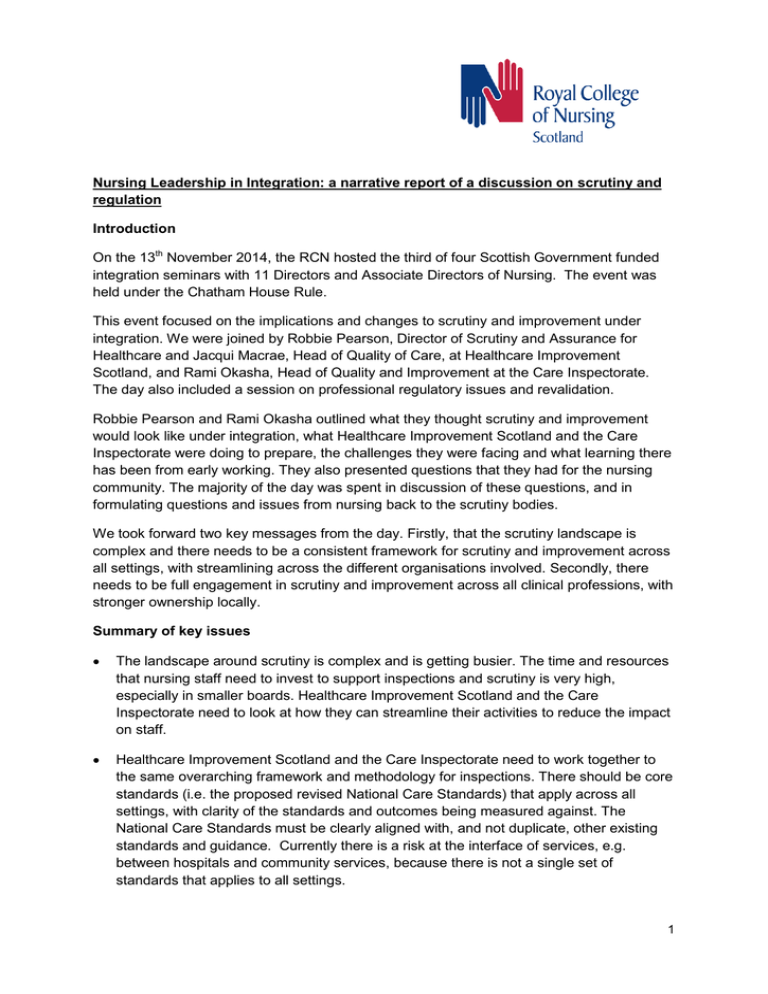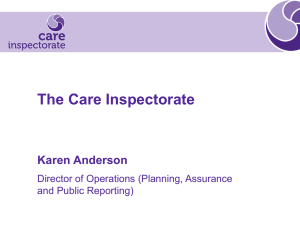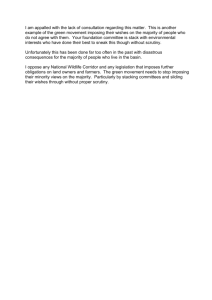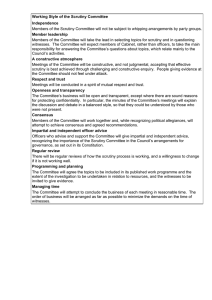Nursing Leadership in Integration: a narrative report of a discussion... regulation Introduction
advertisement

Nursing Leadership in Integration: a narrative report of a discussion on scrutiny and regulation Introduction On the 13th November 2014, the RCN hosted the third of four Scottish Government funded integration seminars with 11 Directors and Associate Directors of Nursing. The event was held under the Chatham House Rule. This event focused on the implications and changes to scrutiny and improvement under integration. We were joined by Robbie Pearson, Director of Scrutiny and Assurance for Healthcare and Jacqui Macrae, Head of Quality of Care, at Healthcare Improvement Scotland, and Rami Okasha, Head of Quality and Improvement at the Care Inspectorate. The day also included a session on professional regulatory issues and revalidation. Robbie Pearson and Rami Okasha outlined what they thought scrutiny and improvement would look like under integration, what Healthcare Improvement Scotland and the Care Inspectorate were doing to prepare, the challenges they were facing and what learning there has been from early working. They also presented questions that they had for the nursing community. The majority of the day was spent in discussion of these questions, and in formulating questions and issues from nursing back to the scrutiny bodies. We took forward two key messages from the day. Firstly, that the scrutiny landscape is complex and there needs to be a consistent framework for scrutiny and improvement across all settings, with streamlining across the different organisations involved. Secondly, there needs to be full engagement in scrutiny and improvement across all clinical professions, with stronger ownership locally. Summary of key issues The landscape around scrutiny is complex and is getting busier. The time and resources that nursing staff need to invest to support inspections and scrutiny is very high, especially in smaller boards. Healthcare Improvement Scotland and the Care Inspectorate need to look at how they can streamline their activities to reduce the impact on staff. Healthcare Improvement Scotland and the Care Inspectorate need to work together to the same overarching framework and methodology for inspections. There should be core standards (i.e. the proposed revised National Care Standards) that apply across all settings, with clarity of the standards and outcomes being measured against. The National Care Standards must be clearly aligned with, and not duplicate, other existing standards and guidance. Currently there is a risk at the interface of services, e.g. between hospitals and community services, because there is not a single set of standards that applies to all settings. 1 Participants questioned how the scrutiny of financial governance will link to the scrutiny of clinical and care governance, and how the roles of Audit Scotland, the Care Inspectorate and Healthcare Improvement Scotland will fit together to achieve this under integration. There are likely to be challenges at the interface between public and independent/third sector under integration. There was some confusion amongst participants about the responsibilities around accountability and assurance/scrutiny of nursing services delivered in independent and third sector organisations under integration. This needs to be clarified. In addition, it is not clear how revalidation of nurses working in these sectors will work. Certain issues, such as Self-Directed Support, also raise specific issues around accountability and can be open to interpretation. There was discussion about how wide or narrow inspections should be. Inspections should be person-centred and follow the patient pathway. Currently Healthcare Improvement Scotland’s inspections have a very narrow focus on particular issues, while the Care Inspectorate inspections are much broader. There was some concern that Healthcare Improvement Scotland inspections may not be capturing wider underlying issues, because of their narrow focus. A broader approach would allow greater links to improvement. Inspections need to be evidence and intelligence-led, with all judgements made during inspections having a robust evidence-base. Currently there is sometimes an issue with inspectors having varied knowledge and experience. There was discussion around the methodology for inspections, with a suggestion that there should be a single pool of clinical advisers to aid consistency across agencies. There should be greater alignment, at a national level, between scrutiny and improvement functions. Improvement and scrutiny cannot be done in silos. Participants raised why there is not a single body to support scrutiny and/or improvement across health and social care. There needs to be engagement in scrutiny and improvement activities across the whole clinical community, with all professionals taking responsibility. Medical Directors must be fully engaged. Culture is very important. Participants commented positively on improvement support from Healthcare Improvement Scotland. However there needs to be greater ownership of improvement and assurance activity locally. This will require building capacity at a local level. What are the skills and expertise needed for an improvement team? If Healthcare Improvement Scotland developed a model/pool of clinical expertise to support their own scrutiny and improvement activities, this could also be used to help build capacity for improvement at a local level. The importance of nursing assurance frameworks was discussed, including for community services. The use of data to drive improvement needs to be owned locally. There was some discussion over what can be measured and what is not easy to measure. Nursing also needs to be able to gather intelligence and articulate what it is doing well. 2 There was a short session about regulation and revalidation at the end of the workshop. There was concern amongst participants that the timescales for introducing revalidation were very tight and that there was not enough time to prepare for the pilot or revalidation as a whole. They were not clear about what needed to be in place before it is introduced. Revalidation will require significant resourcing. There needs to be a commitment from Health Boards around resources for meaningful continuing professional development. Revalidation needs to be made meaningful for nurses and not just be a tick-box exercise. However participants were still keen to stress that revalidation was a real positive opportunity for nursing, provided the resources were there to support it. There were questions over what the pilot was testing and why practice nurses had not been included in the pilots. There were also issues around who would revalidate nurses in management roles and the need for career pathways for nurses to maintain registration in management roles. We hope that the questions and issues raised by these Directors and Associate Directors of Nursing will support future work from the Scottish Government, Healthcare Improvement Scotland and the Care Inspectorate, as well shape the support offered to our nursing leaders by the RCN in Scotland. Thanks We’d like to thank the Care Inspectorate and Healthcare Improvement Scotland for their input to the day. There was very positive feedback from participants on how useful they found their presentations and discussion. Our thanks also go to the Scottish Government for funding this event. January 2015 3


